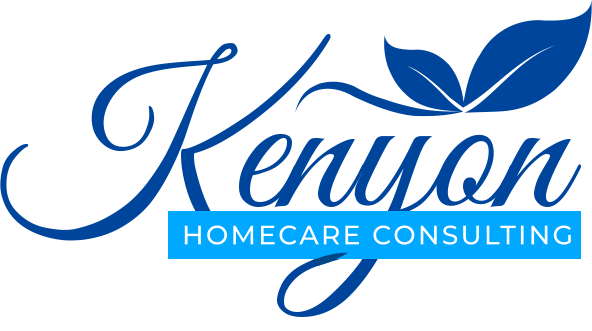Kenyon Connects
AGENCY STARTUPS & DIVERSIFICATION

We frequently get calls about those looking for help starting a home care, home heath, and hospice agency. It’s part of what we do. However, it is important that those looking to jump into the homecare and hospice arena understand the process, the cost, and whether it is a good fiscal move. Here are some things to consider ahead of time to help determine if you are prepped for success. 1. What’s Your Background? Have you worked in the industry? Have you have been on the business end or the clinical end of an agency. This doesn't mean that you cannot start a successful homecare agency without it, but you will have more education on the industry standards and regulations than those already versed in them. 2. What Competition Do I Have? This is something you definitely have to consider. If there is market saturation in your area, you may be climbing a really steep hill to get any market share. 3. Differentiation: After compiling the data from the competitive analysis, do you need to look at providing a niche’ service or product to fill a gap in your community? These are the types of things that can someone in a saturated market obtain market share. 4. Leadership: If you come from a strong business background, then you need a strong clinician working with your agency. The same holds true for those who are clinicians. If you don’t have strengths in both departments, then get the right people around you to support your start-up. 5. Finances: Look, starting an agency takes money. Depending on where you are located in the country, here is what it typically takes to get yourself up and running: Homecare: $40,000-$80,000 Non- Medicare Home Health: $60,000-$100,000 Medicare Certified Home Health/ Hospice: $150,000-$350,000 Those numbers may appear to be more that what you anticipated, but you have to look at the costs to provide services to patients up front before you are allowed to bill for reimbursement. It includes costs of overhead that will also accrue while you await survey. There are licensure fees, software, EMR fees, training costs and more. Then, for those considering Medicare certification, you have the capitalization requirements needed in order to get your 855 approved and move forward. That money has to remain in place to show CMS you have the necessary dollars required to operate. This is not to discourage someone from moving forward, but to make sure someone goes into the process ready to succeed and not begin a process they do not have the funds to complete. . Kenyon Homecare Consulting Can Help You Start-up Successfully: At Kenyon Homecare Consulting , we offer a comprehensive list of products an services to help those starting an agency as well as those currently in the industry. Our senior level consulting staff can help you with solutions to your business and start-up needs. Call us today at 206-721-5091 or contact us online to see how we can help you!

Have you wanted to start up a new program or diversify services in your agency? Many home health agencies see patients with private payers as well as Medicaid, but have stayed clear of the Medicare world. If that is you, then let’s talk about some things to consider when making your decision to become Medicare certified. Top 5 Things To Consider When Becoming Medicare Certified: Many owners consider the larger profit margin potential with Medicare, but don’t go into the process with eyes wide open. Here are the things to research prior to submitting an 855 form to Medicare: Do you have the money you need? If you want to start in this business with Medicare out of the gate, then you need to anticipate start-up costs in the area of $150,000-$350,000. Now, for those already established with infrastructure in place, it will not be as much, but you still need money in the bank to operate on while you await certification. You will need to continue to serve clients on your dime while you await survey. This also leads to the question of accreditation versus state survey. Many states are now requiring the initial survey be completed by an accrediting body. If you are not in one of those states, then you need to know how long the state is backed up on completing initial surveys. If the state is backlogged by 6 months once you declare survey readiness, you have the costs of maintaining patients and paying staff a lot longer than the accreditation route. So, you need to make the best decision financially. 2. Know your regulations and steps to certification: This is a must. Agency owners and administrators must know the Medicare certification process and what regulatory compliance will mean in terms of staffing and operations. 3. Complete a competitive analysis: You need to know if you have a shot a market share in your area. Do a deep dive into the competition to know if you can break into the Medicare market in the communities you wish to serve. 4. Know the patient market: As part of the competitive analysis, you will find out who your potential competition serves. This will also guide you to know if there are gaps you can fill. Maybe your communities have specific needs your other Medicare competitors don’t adequately serve. We see this often in diverse communities where language is a barrier. Cultural sensitivities may unlock an underserved client base in your area. You can be the agency these underserved populations want to have in their homes because you have taken the time and effort to educate yourself on different cultural needs. 5. Consulting: If you are new to Medicare certification, having a seasoned consultant on board makes the process much easier. You can eliminate the question marks you have with the steps of the process. Yes, this will be an additional cost, but if you can avoid errors in your 855, decrease time in the process of getting started, and get through surveys successfully the first time, the money is beyond worth it. We hear from agencies trying to do it themselves for extended periods of time unsuccessfully who now want the help. Whether it has been issues with policies, survey failures, hiring the right staff, operations, education, or software implementation, it is a lot to handle. The mistakes and lost time costs agencies a lot more. Kenyon Homecare Consulting Can Help! At Kenyon Homecare Consulting , we can help brand new start-ups or those looking to diversify into new service lines. We have seasoned consulting staff with decades of experience doing it themselves. If you would like to look further into the Medicare certification process, give us a call at 206-721-5091 or contact us online to see how we can help you succeed.

About thirty years ago, most home health agencies were non-profit Medicare agencies. Many had private pay home care as part of the organization's services. Back then, most of the Medicare agencies were VNAs or attached to a hospital system. We had our Medicare caseload and then there was the private pay which also included the DSHS Chore Services personal care program. There were few free standing private pay agencies. Approximately twenty years ago many of the Medicare agencies began to drop their private pay programs. It was about that time that that HCFA, now CMS began to allow for-profit organizations to participate in the Medicare Home Health benefit. The Medicare rules began to be enforced and those agencies which ran the private pay home care with the Medicare began to close the private pay sections because they were losing money. Most of that had to do with running the agencies under the Medicare license thus costing considerably more with less income to balance the P&L. We are now coming full circle with Medicare Home Health and Private Pay services. We are beginning to see articles in the industry media about the need for diversification and alluding to the inclusion of home care private pay services as another revenue stream for the Medicare Certified agencies. For those Medicare Home Health agencies considering this move, there is one word of caution, run the new private pay company under a separate license. In looking back at why Medicare Home Health and Hospice agencies divested themselves of the private pay, it is clear that applying the Medicare rules to private pay made the private pay business a loser. In addition, the home care private pay business is a very different type of business and must be run differently. While Medicare is highly regulated, private pay is either moderately regulated or not regulated at all depending on the state. The managers of the home care private pay agency must be open minded and able to respond to the environment without regard to the constraints of Medicare. We have found that Medicare Home Health or Hospice staff has difficulty moving out of the regulated box they live in. It is for that reason we recommend that if you are considering this addition, you should run the home care private pay under a separate license with different home care staff. Diversification to include a private pay program may still not be enough. As the competition becomes more intense for the private pay line of business, we are now seeing the need for home care private pay agencies to differentiate themselves from others as well. No longer will the tried and true personal care services only guarantee success. Private pay home health must add additional streams of revenue in order to survive and grow. There is no single set of services that will fit all agencies. Just as all politics are local, so are services. Diversification takes two different forms in the private pay industry, additional lines of services (e.g. Cruise Companions, Day Surgery Support, Mom and Babe, pharmacy drug reviews with recommendations and counseling, home modifications and Holiday Helpers) and value added products that are part of service packages. Value added products include such things as Life Alerts, pharmacy discount and delivery, and financial management support. When addressing value added services, the services are included in the hourly or daily rate. The clients do not pay extra for these services or products, but receive them as part of agency package. As long as the client is a customer of the agency, they automatically receive the product or service. The cost of the value added is embedded in the hourly or daily rate by calculating the cost of the value added feature and dividing that cost by the hours of days of services currently provided by the agency. Sometimes the extra charge is as little as $.25/hour more. Whatever services or value added elements you select, they must be services or products that your particular customers view as something they are willing to pay for or see as an added value. With this in mind it is critical that you survey your customers to make sure they see what you have to offer is something they want. If you need help with determining what other services or value added elements would be appropriate for your agency, call Kenyon Homecare Consultin g at 206-721-5091 or contact us online today!

When we consider the value of a home care agency, it’s seldom that the internal operating systems are part of the consideration. However, how your home health agency’s operations are set up and run has a direct correlation on your operating expenses and, therefore, the value of your home care agency. It’s often said that your home care company is set up with the idea that someday, you will sell. For that reason, it is imperative that you systemize your internal operations . A solid infrastructure for your home health agency reduces expenses and adds value Where to Start: Software is a good place to start. What software will you be or are you using? And, most importantly, is your staff using the software that way it is designed? All too often, while conducting a due diligence for sale or purchase, we find that a home care agency has a very good software product, but staff is doing “work around” because they want data or information in a different format. Do not allow “work around”! It increases costs and reduces the value of the company. In addition to “work around”, we discover staff developing tracking sheets in excel or other programs. This only consumes their time and adds very little value to your home care agency. Regularly review all processes in your company for necessity and for value to the company in terms of information or data needed to make decisions. Systems and processes that are not adding value to the decision making process or document needed information need to be discontinued. Conduct a yearly evaluation of your systems and processes to make sure they meet the needs of your home care agency, add value, and are not taking staff time that serves no added value. The recruitment and retention system is another internal system that needs to be reviewed and refined annually. As with other systems, the more routine you can make the system, the less time and money it costs. Who is responsible for placing caregiver ads, reviewing submissions to assure applicants meet requirements and for scheduling interviews and testing? When is this done and how many people need to be involved in the system? How often is the system reviewed for potential cost savings? In addition, what is the cost of the retention system? Is it achieving the desired results? Payroll and billing is another essential part of the infrastructure. If you are on a computerized system with a good point of care application, most of the billing and payroll will be created when it is time to roll payroll or billing. In addition to the payroll and billing system, the system for collections will have a direct impact on the value of an agency. A sound collections system assures that your home care agency’s accounts receivable are never more than 45 days. This will also increase the value of the home care agency. The more automated your systems, the less the cost is to your operations and the more valuable your agency. Your management team also influences the ultimate value of your home care company. Who is responsible for decision making in different areas of the home care agency? Frequently, we find the owner has retained decision making in their position. Failure to invest in your managers and give decision making authority over their areas of responsibility ultimately makes your company less valuable. Your job, as the owner, is to eventually make yourself obsolete. Doing so places the value in your home care agency – not you – when you’re ready to sell. If you are having difficulty establishing internal systems that are cost effective and achieve desired results, Kenyon Homecare Consulting is here to help. Call Ginny Kenyon at 206-721-5091 or contact us online . We are here for you.

To say that the world of homecare, home health, and hospice is competitive is an understatement. If you want to stay in business, then you have to continually look at quality improvement and expanding services to meet the needs of the communities you serve. When we talk about expansion we are not just talking about adding more offices or purchasing an existing agency, you need to take a hard look at whether a niche service solidifies market share in your area. Not Sure What Your Niche Is or Should Be? Picking the best niche for your area is every bit as important as how well you do it. If you currently provide one line of service like home health, then you may want to consider adding hospice or a private duty line of service. The ability continue to see a discharged skilled patient under private duty allows that patient to have continuity of care and remain connected to your agency should a another skilled need arise. If you decide to go the hospice route, then you keep a client once there is no rehab potential under a skilled program and it is time for end of life care. You may not be thinking about adding a whole new line of service, but specializing in something you already provide. The first step is to consider the market and what is already out there. It doesn't make sense to develop a niche service if someone in the area is already providing it and has the lion's share of the business. Let's consider several options under an agency already operating a skilled home health. Pediatric Chemo Certification: Pediatric chemo often requires a chemo certified nurse to complete it unlike your typical 5-FU infusion that has been done at home for years. So, how many agencies in your area can provide this service? It is common for those hospitals servicing pediatric cancer patient not have a provider in rural areas. This leads to either the patient coming back into the hospital to receive treatment each time or an agency that is far away having to be paid a whole lot more to travel into rural territory to provide the service. This may be something completely untapped in your area and therefore allow you to negotiate rates that make it lucrative to provide the service even if there is more travel to do so. Specialty Infusion: There are still many agencies that shy away from providing infusions in the home. Maybe your agency will infuse an antibiotic, but won't do chemotherapy or IVIG. These are infusions that allow you to negotiate rates that allow you to turn a decent profit on every visit. Pediatrics: The majority of skilled programs out there don't specialize in pediatrics. If you have a pediatric nurse that comes on board, you could really market the specialty for your agency. Partnerships with pediatricians or children's hospitals are key for this. Unless the agency is specifically a pediatric agency, this is an often untouched specialty for the industry. Psych Nursing: Again, this is where partnerships with mental health professionals and hospitals could really make you thrive in your service area. A good qualified psych nurse can add so much quality to the care of your patients, especially considering how many mental health issues have come to light since the pandemic hit. Anxiety and depression are so often missing from our care plans when they are key to a patient successfully completing goals. Respiratory Therapy: Having a respiratory therapist to assist and consult regarding patient care is a huge thing to increase the level of confidence this physician specialty has in your agency. Just like with nurses who have a psych or pediatric specialty, the respiratory therapists communicate differently with physicians based upon the specialty. They know how to quickly and efficiently provide the MD the data needed for the physician to make the best medical decisions at home. Now, You Have To Market Yourself Well: The biggest issue agencies have with specialty programs is not marketing them well and developing partnerships with the right providers and payers to have the program flourish. It is a process and you have to have a good plan in place for it. Should you need with adding a service line or deciding on a niche market, call Kenyon Homecare Consulting at 206-721-5091 or contact us online . Our senior consultant have decades of high level experience with expansion and adding service lines or niche programs.

Whether you are looking to buy or sell a home care, home health, or hospice agency, there is a lot to do before you make the call. In our experience, agency owners are not always prepared when the decision is made to hang a for sale sign on the business. Let's look at things to consider when you want to sell or are looking to buy an agency. You want to make sure you get the proper dollar for the business you are selling or pay the right amount if you are the one ready to write a check! 5 Considerations Before Your Business Is For Sale: Well, consider the reason you are looking to sell your agency. Do you feel it is something you have to do or is it something you want to do? Ultimately, most buyers will want a due diligence to be completed prior to ever buying and you need to be prepared for it. Let's look at 5 big things to dive into when considering the move to sell: Clinical: Obviously this is a big one. Where are your outcomes right now? Are they better, worse, or the same over the last several years? Are your clinical processes solid or do things easily slip through the cracks in patient care? How well does your clinical manager know what is happening with patients? How is care coordination and how are service frequencies determined? What about efficiencies? How does documentation look? How many of your last 10 ADRs paid? If they didn't, what was denied? What about the accuracy of coding? How many days from admission until the RAP? These are things to firm up prior to ever considering a sale. Someone buying your agency needs to know that the process works. Financial: What is your current accounts receivable? How far out are you on collections? Is billing up-to-date? Have you lost reimbursement due to timely billing? If so, how much? What is the process from RAP through final billing? How often do you bill? Can you explain your costs in depth? What is your average mileage per clinician per day and per visit? Before you sell your agency, you need to be able to present the best financial picture possible to ensure you get the dollars the agency is worth. What is your average HHRG and visits per episode? Have you tried to decrease costs where it is possible to improve your bottom line? Marketing: What has your marketing plan been in the last 2 years? Are admissions up or is there a trend down? What has your marketing budget been? Is there really a true targeted marketing plan? Where do you focus your marketing efforts? What is your competition and how are they achieving market share? Personnel: What are turnover rates? How seasoned are your clinicians? What is the average length of time someone is employed with your agency? Basically, is your staffing volatile or stable. If it is NOT stable, can you explain what the problem is and how you are working to resolve it? What is your onboarding process? How do you provide oversight to employees and departments? Administration: Part of the changes in 2018 to the COPs dealt with the administrative oversight in agencies. How involved are you in running your business? Do you keep policies and procedures up-to-date and run your business accordingly? How does your report card look and what needs to change prior to selling your agency? Buyer Beware: If you are an established agency looking to acquire additional agencies, then some of the red flags brought up here today may not be an issue for you because you already have the infrastructure and administration in place. For others, the term buyer beware is important. Many of those situations mean that you are buying a business you want to keep rolling once the ink is dry on paper. If big problems exist, then you may be in way over your head. Make sure you have done a due diligence on the agency you look to purchase. Having someone look in-depth objectively at everything about the agency will give you a better plan moving forward and also help you determine how much the agency is actually worth. Let Kenyon Homecare Consulting Help: At Kenyon Homecare Consulting , we help agencies prepare for sale and help provide the due diligences for individuals looking to purchase agencies. If you are on either side of that coin, call us today at 206-721-5091 or contact us online to see how we can help you make the most out of your sale or your acquisition.

Starting an agency in home and community based care has a lot of steps and you need to make sure you considering everything before you jump in. It is time consuming and costs money, but utilizing a consultant will help you meet your goals quicker and more accurately as they have decades in the industry as senior level executives.

We hear a lot about “quality of care” in home care, home health and hospice, but seldom is it defined in terms that allow us to quantify what it really means or what it looks like. “Quality” is both objective and subjective. One method of measuring quality is by outcomes, yet even those have subjective elements. So, how do we determine quality? What are the solid elements that will tell us we have quality? Simply defined, quality is what our home health, home care and hospice customers and payors tell us it is. Expectations drive the quality issue. Since expectations can be broad based on who is defining them, how do we set a list of quality indicators that meet the customer’s expectations? Indicators we can measure. It is fair to say, because we are in the caregiving business, the first expectation of our customers is that our home care caregivers will care about them and their issues. That sounds pretty simple – until you define what caring looks like and how you’ll measure it. One measurable criteria is following the care plan. Is it being completed as designed? For home care, care plans are developed around the client’s wishes for care. If it is not being followed, we need to know why. It is also regulation that aides follow the plan of care. Another element of measurable criteria for the care plan is the frequency with which the aide has identified needed changes to the plan and notified the supervisor that the client’s needs have changed. For clinical staff, the frequency of care plan updates and changes are also a clue to engagement and the quality of the care being provided. When the plan of care is not being followed, and there are no updates or changes to the care, it may be an indication that the caregivers are not engaged with the client/patient or are not “tuned in” to the needs and wishes of the client/patient. While this is still a subjective measure, it can be used as an indicator of caring. A second big issue for customers that relates directly to quality of care is the knowledge of the caregivers and their use of knowledge. Outcome measures, depending on how they are applied, can be a good indicator of expertise and skill in caring. For example, your private duty agency may expect aides to monitor the client’s blood sugar values and report when the values fall outside the range established by the clinician. The aide needs to be taught about blood values, including how to read the monitors and determine if the reading is within or outside the established range. Additionally, the aides need to be taught the presenting symptoms of high and low blood sugar and what to do for the client in each case. Whatever parameters you set to measure knowledge, they must be indicative of the diseases and disabilities common in the client case load and should be reflected in the ongoing in-service training program for the agency. With competition becoming increasingly fierce, now more than ever, the agencies that win will be those perceived by their customers as caring and knowledgeable. So, while we all know how to track the agency’s financials and regulatory requirements, you also want to add quality indicators of caring and knowledge to the dashboard. If you are struggling with trying to figure out how to increase the business of your agency and need some help identifying and applying quality indicators to your agency, Contact us. We’re happy to help. We hear a lot about “quality of care” in home care, home health and hospice, but seldom is it defined in terms that allow us to quantify what it really means or what it looks like. “Quality” is both objective and subjective. One method of measuring quality is by outcomes, yet even those have subjective elements. So, how do we determine quality? What are the solid elements that will tell us we have quality? Simply defined, quality is what our home health, home care and hospice customers and payors tell us it is. Expectations drive the quality issue. Since expectations can be broad based on who is defining them, how do we set a list of quality indicators that meet the customer’s expectations? Indicators we can measure. It is fair to say, because we are in the caregiving business, the first expectation of our customers is that our home care caregivers will care about them and their issues. That sounds pretty simple – until you define what caring looks like and how you’ll measure it. One measurable criteria is following the care plan. Is it being completed as designed? For home care, care plans are developed around the client’s wishes for care. If it is not being followed, we need to know why. It is also regulation that aides follow the plan of care. Another element of measurable criteria for the care plan is the frequency with which the aide has identified needed changes to the plan and notified the supervisor that the client’s needs have changed. For clinical staff, the frequency of care plan updates and changes are also a clue to engagement and the quality of the care being provided. When the plan of care is not being followed, and there are no updates or changes to the care, it may be an indication that the caregivers are not engaged with the client/patient or are not “tuned in” to the needs and wishes of the client/patient. While this is still a subjective measure, it can be used as an indicator of caring. A second big issue for customers that relates directly to quality of care is the knowledge of the caregivers and their use of knowledge. Outcome measures, depending on how they are applied, can be a good indicator of expertise and skill in caring. For example, your private duty agency may expect aides to monitor the client’s blood sugar values and report when the values fall outside the range established by the clinician. The aide needs to be taught about blood values, including how to read the monitors and determine if the reading is within or outside the established range. Additionally, the aides need to be taught the presenting symptoms of high and low blood sugar and what to do for the client in each case. Whatever parameters you set to measure knowledge, they must be indicative of the diseases and disabilities common in the client case load and should be reflected in the ongoing in-service training program for the agency. With competition becoming increasingly fierce, now more than ever, the agencies that win will be those perceived by their customers as caring and knowledgeable. So, while we all know how to track the agency’s financials and regulatory requirements, you also want to add quality indicators of caring and knowledge to the dashboard. If you are struggling with trying to figure out how to increase the business of your agency and need some help identifying and applying quality indicators to your agency, Contact us. We’re happy to help.

Embarking on a new adventure in life is always exciting—and usually challenging. You’ll likely need a little help along the way whether you’re starting a new career, getting married, or going down a new path for your existing homecare organization.This article is full of recommendations including a cheat sheet for startups. How to Secure Successful Homecare Startups Successful homecare startups don’t often come easily. To be sure you’re headed in the right direction, you need several tools. Among those tools? A handy-dandy cheat sheet. Below are 9 hacks you can use to create your own homecare startup cheat sheet. 1. Start with Research Before you can make plans to move forward with your homecare organization, you should know what you’re getting into. First, consider your location. Is it ideal for the services your agency will offer? Do the clients in the chosen area need those services? Who is your competition? What services and rates do they offer? In addition to location, research what it takes to run a successful homecare organization. Reaching out to knowledgeable industry experts is often your best resource. 2. Design a Business Plan Operational systems, policies and procedures, hiring goals—these necessities and more need to be determined before you open your doors or launch a new business line. There are numerous groups and organizations you can join for inspiration and support. 3. Create a Budget When launching homecare startups, it usually takes six months to a year before you start seeing a profit. Be sure to budget for this time, not only with funds for your personal needs but also money for business expenses. Think overhead, costs to hire staff, business equipment, and required employee education. 4. Get the Word Out Marketing early and often shouldn’t ever be put on the back burner. It’s recommended to begin your marketing efforts and promote well before the grand opening. Again, seek out industry experts for great ideas on how to most effectively market your new services. 5. Secure Resources Most successful homecare startups complete this step well before launch day. What do we mean by resources? Mainly, documents needed to run a smooth, competent operation. Everything from aide competency testing kits to policy and procedure manuals should be purchased and customized early to save time and hassle in the long-run. 6. Prepare Your Workforce Start by hiring the right people, which is much easier once you’ve obtained the best aide competency testing kit. Then provide advanced education for the elite staff who make the cut. This type of training goes beyond the basics and ensures your employees are a step above the pack when providing client care. 7. Form Partnerships Starting a community business makes you an integral part of said community. As such, it’s important to build relationships with other professionals in your area. Not only does this show that you’re invested in the town, but also benefits your bottom line. For example, in homecare, forging partnerships with doctors, rehab centers and hospitals leads to client referrals. 8. Join an Association of Homecare Professionals It’s crucial to stay up to date on industry happenings, trends, and news to remain current and compliant. Joining a professional homecare state or national association is a good way to stay knowledgeable and relevant in the industry. 9. Work with an Industry Expert In homecare, just like as in life, you sometimes need advice and encouragement. Whether you’re expanding your services, it’s your first time launching homecare startups, or you’re opening a new location, support is essential. Working with an industry expert helps you stay on track and experience success. Finding an Expert in Homecare Startups At Kenyon HomeCare Consulting, we know what it takes to succeed as a homecare organization in today’s marketplace. From researching a location, to hiring, and acquiring needed resources, we can help with all the steps along the way. Reach out to us to learn how we’ve assisted with numerous successful startups and what we can do for you!

Imagine embarking on a homecare startup and not hitting a single bump in the road. Or expanding your services and growing your business to a level of success you never dreamed possible. While it’s nearly impossible not to encounter any issues during a startup or growth process, there are ways to help things run more smoothly. Six Crucial Factors of a Successful Homecare Startup Whether you’re starting from scratch, adding a location, or expanding your services, to-do lists can quickly become overwhelming. And when that happens, progress falters. Consider the “who, what, when, where, why, and how” of an excellent homecare startup, and you’ll be on your way. The Who Any successful entrepreneur knows a big part of achieving your dreams is surrounding yourself with the right people. These friends, colleagues or experts encourage, provide advice, guide, and point out when you’re headed in the wrong direction. How does that relate to a homecare startup? You need a support system to get through the road bumps of this tedious process. Here are a few people to include in that support system: An experienced consultant. Someone who knows the homecare industry inside and out. Assists with planning, marketing, hiring, setting realistic goals and more. Professional referral sources. Medical professionals who provide knowledge, advice and become excellent sources for future referrals. Get to know them by networking. An elite staff. A must have for any leader— a productive, knowledgeable, efficient team. The What Now that you know who you need for a successful homecare startup, it’s time to discuss what you need. This is a line of attack— a business plan, a marketing plan, and an operational plan. Let’s break that down a bit. Getting started on the right foot is all about strategic planning and developing. Begin with market research to determine how you should go about getting ready to launch. Next, create a business plan and include the following: Operational and systems development Methods for staff recruitment, training, development, and retention Marketing plan, support and analysis Branding, website development, logo design, etc. Funding details The When When do you start each step of the homecare startup process? The simple answer is now! But to be more specific, start getting the word out about your homecare agency, new services, or new location as soon as you set a launch date. It’s important to get people in your community excited about what you’ll be offering so they can brainstorm ways to get involved. Next, firm up the specifics of your business plan. Do your research, lay out details, and set precise time frames. The more structure you establish upfront the better. With your plan in place, you can begin looking for experienced staff. The Where Determining where your new agency will be located may be tough. You want to make sure the demographics are right and that there’s a legitimate need for your services in the chosen area. To help with this decision, conduct a competitive analysis to evaluate the competition. Always investigate industry trends and learn what services are needed in your market. The Why Remember your “why.” What’s the motivation behind starting a homecare organization, expanding your reach, or adding specialized services? Remind yourself daily of the reasons you’re working hard to reach your goals. Doing this gives the push you need to get a running start and the confidence you need to grow your organization. The How The details that could be included with the “how” are vast. But when learning how to complete a successful homecare startup, the key is to take the process one step at a time. Plan thoroughly, spread the word, grow your support system, seek expert advice and then get to work! Experienced Consultants and Your Homecare Startup At Kenyon HomeCare Consulting, we know all about the “who, what, when, where, why, and how” of a homecare startup or expansion project. We go beyond the basics to give the kind of service that drives your agency toward success, including experience in: Due diligence Community assessment assistance Administrative policy and procedure manuals Employee handbooks Forms and tools Software selection Reach out to us today, and let’s see what we can accomplish together!
